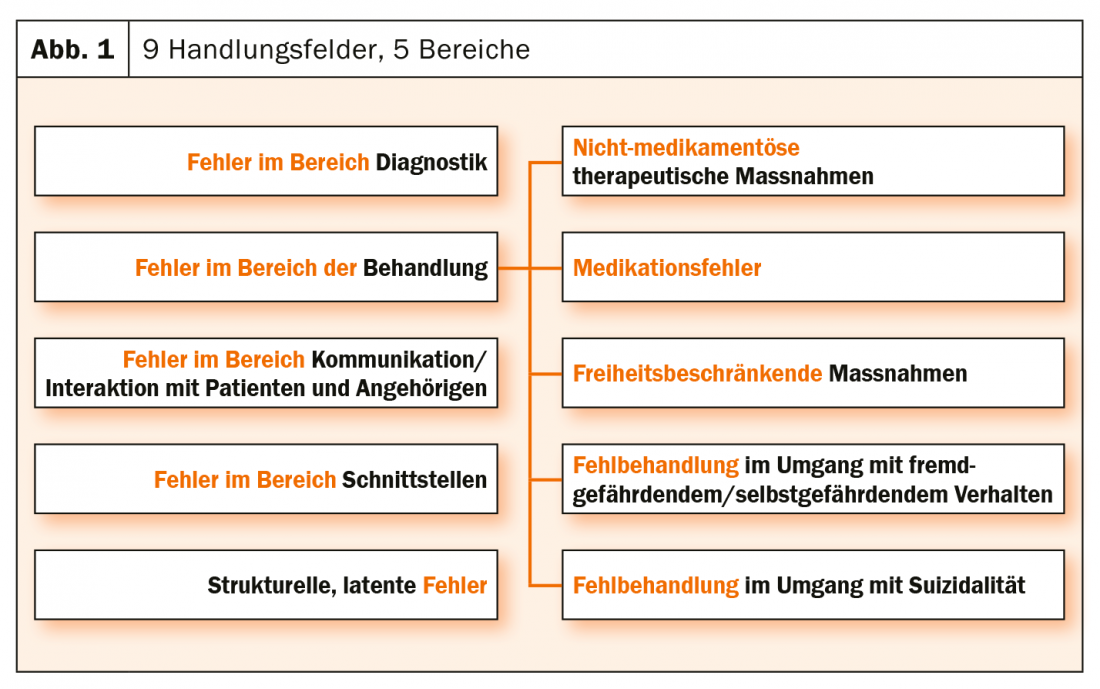The Swiss healthcare system is considered the second most expensive in the world after the USA. The quality of the services is impressive, but not in proportion to the costs. An essential part of a physician’s job is to provide patients with the best possible care. Therefore, quality assurance plays an important role.
The protection of the patient and thus the obligation of physicians to use effective therapies has its roots as early as the 18th century B.C. In ancient Egypt, draconian punishments were imposed if a physician injured his patient or used impure tools [1]. In the mid-60s of the last century, Avedis Donabedian developed a quality model, which is still recognized today, that distinguished in a two-dimensional grid between structural, process, and outcome quality, as well as technical, interpersonal, and moral or ethical quality [2].
Areas of responsibility
Medicine is considered a profession in its own right. This includes defining the scope of activity and services rendered, education and training, as well as admission to professional training itself and conducting research on its own activity. With the introduction of the Health Insurance Act (KVG) in 1996, this professional self-regulation was restricted. It is now up to the Federal Council to review and actively address quality assurance. On the one hand, quality assurance and promotion is now handed over to the federal government by the respective legislation. The latter issues guidelines in the field of education and professional practice, regulates the requirements for the accreditation of service providers and establishes values for the development and publication of quality information. The cantons are also the licensing authority, assess the quality and efficiency of hospitals, and support the binding nature of the federal government’s quality assurance measures and quality measurements for service providers [3].
Patient safety writ large
Extensive experience in Germany and abroad has led to a situation in which mainly health professionals are concerned with the implementation of quality assurance systems. In particular, the spread of DRG systems has brought about a number of developments, such as the discussion of processes and treatment standards [4]. In Germany, hospitals were required to implement quality management even before DRG systems were introduced [5]. In Switzerland, too, the federal government formulated a quality strategy before the introduction of the DRG system in 2012 [6]. This is implemented by the Foundation for Patient Safety.
The foundation’s main goal is to identify risks, deal with and avoid mistakes, and improve the safety culture [7]. In addition to medication, digitalization, design and communication, surgery and oncology are also the focus of the activity. All care sectors from inpatient to outpatient to long-term and psychiatric are covered. In contrast to efforts in the care of patients with somatic illnesses, patient safety in psychiatry still receives too little attention. That’s because data collected showed that one in three health care professionals has remained silent when faced with safety concerns. The reasons for this are hierarchies and resignation. But more than half said they had already prevented an incident by voicing concerns. This shows how important it is to deal with each other openly and reliably.
Therefore, an action plan “Patient Safety in the Care of People with Mental Illness” was launched. Following a review of the current situation with nine fields of action, this plan provides for the implementation of measures in five areas (Fig. 1) [8]. These relate to awareness raising, research, implementation and education/training.
Improve resources
However, information and measures on patient safety and quality of care alone are not enough to improve health care. Health care facilities must also have the resources to implement them in their day-to-day practice. This requires an improved organization that implements the measures effectively and reliably. For this, all stakeholders should work together – from hospital management to family caregivers [9].
Summary
|
Optimized practice processes
A lot is also happening in outpatient care. The focus of any quality management in the practice is patient-oriented process optimization and patient satisfaction. In doing so, the systems can be adapted to one’s own needs and the needs of employees and patients. Optimized practice procedures and risk minimization can save from human and economic harm. In Switzerland, there are now several foundations whose focus is on the development of quality programs for practices and physician networks (e.g. EQUAM, QBM, GMP or MFA). Primary goals are to raise awareness among participating physicians and staff, clarify basic structures of physician practices, and provide internal benchmarking to initiate quality improvement processes at participating practices.
The main focus of quality management in the outpatient setting is on error management, patient information and education, and interface management. These priorities are followed by team meetings, complaint management, the regulation of responsibilities and competencies, risk management, and the measurement and evaluation of quality objectives. Only the patients are not yet effectively involved in the processes. Patient surveys are almost non-existent. There is still room for improvement here.
Literature:
- https://saez.ch/article/doi/bms.2017.05675 (last call on 14.06.2020)
- http://neuron.mefst.hr/docs/CMJ/issues/2003/44/5/29_BookRev.pdf (last call on 14.06.2020)
- www.bag.admin.ch/bag/de/home/versicherungen/krankenversicherung/krankenversicherung-qualitaetssicherung.html (last call on 14.06.2020)
- Nylenna M, Bjertnages O, Sperre Saunes I, Lindahl AK (2015): What is Good Quality of Health Care? In: Professions and Professionalism, Vol 5, No 1, 1-16.
- Güntert B, Offermanns G (2001): Quality management models for health care, in: lögd (ed.), Qualitätsmanagement im ÖGD, lögd, vol. 9, Bielefeld, pp. 13-3.
- FOPH (2009). Quality Strategy of the Confederation in the Swiss Health Care System, EDI, Bern.
- www.patientensicherheit.ch (last call on 14.06.2020)
- www.patientensicherheit.ch/fileadmin/user_upload/2_Forschung_und_Entwicklung/Psychiatrie/aktionsplan_D_teil_2.pdf (last call on 14.06.2020)
- Vincent C, Staines A: (2019) Improving the quality and patient safety of Swiss health care. Bern: Federal Office of Public Health.
InFo NEUROLOGY & PSYCHIATRY 2020; 18(4): 43-44.












